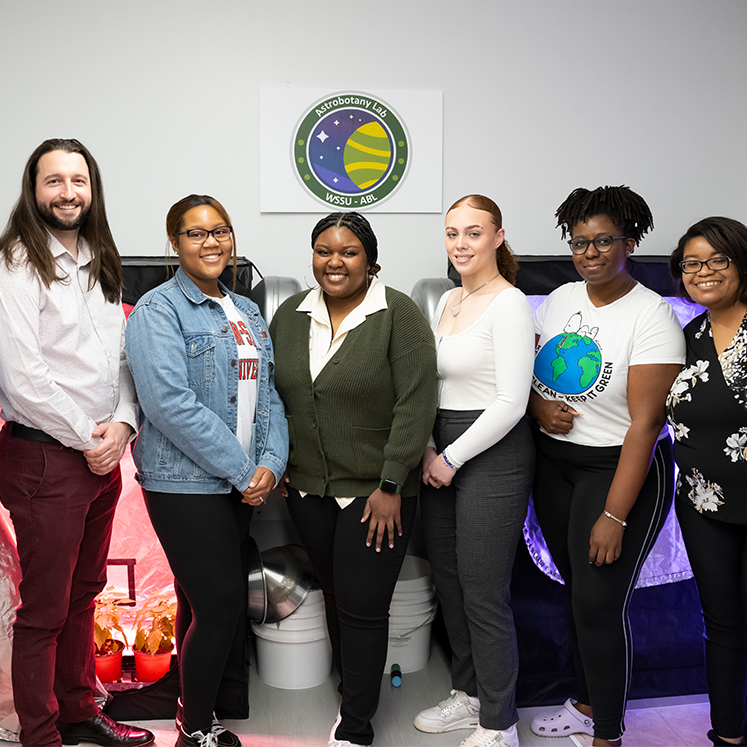WSSU astrobotany students work with NASA and the Kennedy Space Center
Winston-Salem State University’s Astrobotany Lab provides undergraduates with opportunities to work with NASA and shadow scientists and researchers at the Kennedy Space Center in Cape Canaveral. It’s all part of a special partnership between Winston-Salem State University and NASA forged by Rafael Loureiro, Ph.D., assistant biology professor at WSSU.
The partnership helped create the lab on the WSSU campus in 2018, part of a Space Act agreement with NASA to research crop production in space. In layman’s terms astrobotany is the study of plants in off-world conditions.
“The knowledge generated by Astrobotanical studies can be applied to any kind of agriculture field or indoor farming. The applications are pretty much endless. But the ultimate goal is for the lab to be a kick-starter to get students involved with NASA research and opportunities that will, in the future, allow them to continue to contribute to this research field” said Loureiro.

WSSU astrobotany students work with NASA and the Kennedy Space Center.
The ability to have Minority Serving Institution students involved in astrobotany has long been a dream of Loureiro. He convinced NASA that a potential partnership was viable before coming to WSSU. With the crop production team’s support, Loureiro went searching for a university that would embrace his vision. Several universities were interested, but WSSU was willing to give him full liberty to develop his idea. That sealed the deal for Loureiro.
“This is unique to our school; no other school has it,” said Loureiro. “This allows students to go there once a year to participate as interns. That doesn’t deter them from applying for internships themselves. We have one student with a summer scholarship with NASA this year.
“It’s quite a unique experience. I think it just stimulates a student. It really changes them. It changes their perspective about science and themselves.”
Acceptance into the astrobotany lab is not easy. First, because of funding, space and staffing constraints, there are limited slots available. Secondly, one must be a biology major even to apply. Students involved in the program must dedicate a minimum of 10 hours a week to research-based activities and Loureiro says typically most students spend many more.
“We started with four students and now we have six. I had to put a cap on it, or I would have many more and I don’t want the students to not have the proper attention” said Loureiro.
This is the third full year for the program. Four astrobotany students have graduated and Loureiro currently has a cohort of six students.
“It’s been very rewarding to see them getting out and getting hired immediately,” said Loureiro. “If you have this on your resume, people want to know what it is.”
‘What it is?’ is a good question. It’s exactly what the name implies. Astrobotany, Loureiro says, is the combination of knowledge from botanists to introduce how plants and crops respond to off-world conditions, how to understand them and try to improve their responses.
Obviously, the work must be done in artificial conditions. The analog soil is supplied by the Exolith Lab at the University of Central Florida which specializes in creating soil as similar as possible to that found on other planets. Microgravity conditions are simulated, and radiation is used on seeds to emulate the effects of long-term space travel on plant development.
“Currently we are growing several crop species. We concentrate our efforts on pick-and-eat crops like peppers and tomatoes and also on leafy greens like lettuce and bok choy,” said Loureiro. “We have a plan to start growing staple crops like wheat and other crop variants in the near future.”
Loureiro and his students disclose the results of their work with NASA … and no one else. Students must sign a nondisclosure agreement when accepted in the program agreeing to keep all results confidential.
“All the results we acquire we share with NASA, down to the minute detail,” said Loureiro. “When we go to congresses and meetings, we have to be careful about what we present.”
NASA stays attuned to the work going on in the WSSU astrobotany lab, both offering input and utilizing data gathered by the students. “They certainly have an influence on the things we do,” said Loureiro.
While most of the students who come through the astrobotany lab will wind up in a career closely aligned with their studies, some head in a different direction because the lab work is diverse and multifunctional.
“Because a lot of the technology and knowledge we use here is applicable here on earth, these students have a very good amount of knowledge when it comes to indoor farming and hydroponic farming. There is a big demand for trained people in this market right now and students benefit from that,” said Loureiro.
